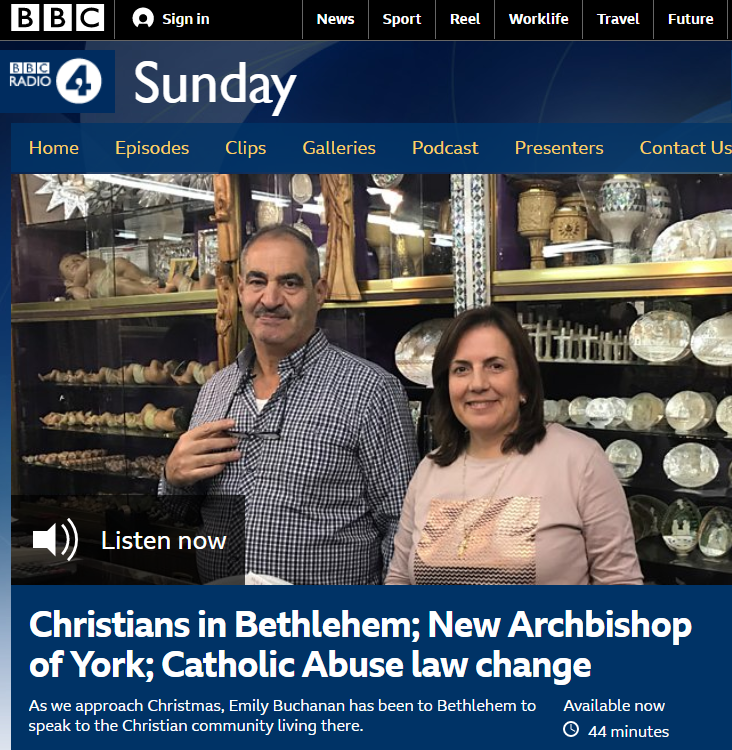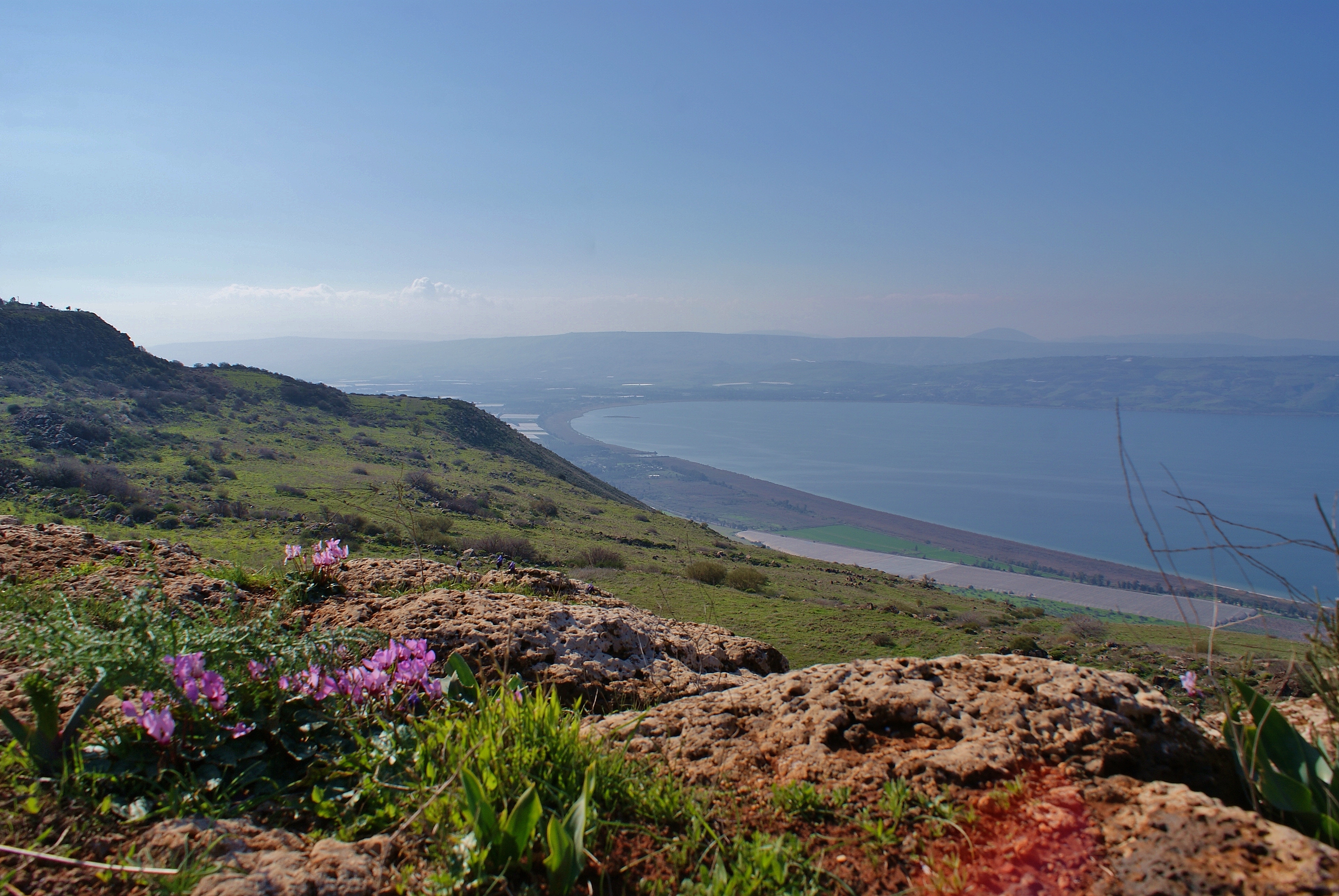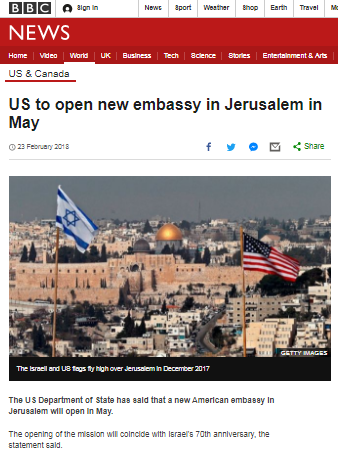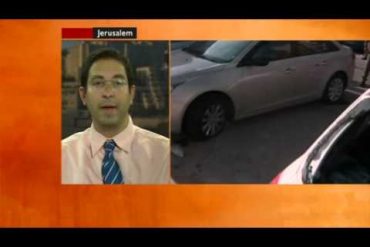h/t MD
The December 22nd edition of the BBC Radio 4 religious affairs programme ‘Sunday’ included a report from the BBC world affairs correspondent Emily Buchanan whose highly problematic video purporting to explain Judaism to BBC journalists still remains on the BBC Academy website.
Presenter Edward Stourton opened the item (from 14:34 here) with a reference to the Banksy agitprop unveiled hours earlier. [emphasis in italics in the original]
Stourton: “Well Christian Christmas has been marked in Bethlehem by a new Banksy installation framing the manger scene with Israel’s separation wall. This time last year Israel allowed some 700 Palestinians living in Gaza to travel to Bethlehem, Nazareth and Jerusalem over the Christmas period. Earlier this month the Israeli authorities announced they won’t be doing the same this year. They say many Gazans who are allowed to visit the West Bank outstay their permits. The episode illustrates the kind of pressures faced by the Christian minority in Gaza and the West Bank. My colleague Emily Buchanan was in Bethlehem not long before the recent announcement.”
That initial announcement was actually amended on the same day as this programme was aired but that fact is not reflected on its web page.
If listeners thought that they were about to hear some in-depth reporting on why Christians from the Gaza Strip “outstay their permits” (none of whom have been interviewed by the BBC in the past year) and what exactly the “pressures faced by the Christian minority in Gaza and the West Bank” are, they would have been disappointed. Emily Buchanan began by describing the scene at the Church of the Nativity in Bethlehem and then spoke to a priest.
Buchanan: “And how is it now? How difficult is it? I mean you’re in charge of the Church of the Nativity which is the big church, the church over the site where Jesus Christ was born. What are the changes that you’re seeing in the Christian community here?”
Priest: “Actually we are having the big problems that the people emigrated from Bethlehem to go around over around the world and the problem is lack of money, the problem lack of freedom. That’s why we are losing people, not gaining more people, getting more.”
The priest went on to state that the Christian Orthodox community in Bethlehem amounts to about three thousand people and commented “but day by day I see less people”.
Buchanan then went to visit a souvenir shop.
Buchanan: “Outside the church is bustling Manger Square with its shops selling olive wood nativity scenes, mother of pearl crosses and colourful ceramics. Tourism is vital to these Christian businesses and a major part of Bethlehem’s economy. One business is run by a couple called, appropriately, Joseph and Mary. Joseph Jacaman is a carpenter and I went to visit him in his workshop.”
After a discussion with the carpenter about his carvings, Buchanan told listeners that:
Buchanan: “Business fluctuates with every outbreak of violence in the region and many Christians have opted to emigrate.”
Listeners were not of course told who is responsible for those ‘outbreaks’ of violence before Buchanan went on to speak with the shop owner’s son.
Buchanan: “I asked him what pressures they’re facing.”
Jacaman: “Palestinian are suffering always in the holy land. Either Christians or Muslims, they are suffering the same way. I mean political situation is not good. Don’t have long-term plans. The war would start in this region any time. Intifada will start any minute. Business goes up and down. Things keep changing and it’s the holy land. You want to live in the holy land? You have to get used to this. It was never peace here. Go with the history, hundred years ago, it’s the same always.”
Buchanan: “How do you live day to day here when it’s so hard to plan ahead and to know what’s going to happen?”
Jacaman: “You have two options. Option one is to do like many people; just keep saying situation are not good, situation is not good, we can’t invest, we can’t do anything and you stay where you are. At the end you will just leave this country and go live abroad and I don’t know what kind of life you can have. I’m sure 10% of the people who went outside they lived good life. But 90% are still poor because they couldn’t do anything in their country they can do it outside.”
Buchanan: “What sort of message would you like to send to the audience who might be listening to this programme in England?”
Jacaman: “What we have been asking for years and years: just pray for peace. Pray for peace in the holy land, even now in the Middle East.”
The item ended there and while one cannot blame either of Buchanan’s interviewees for skirting the real issues or promoting the notion that both “Christians or Muslims, they are suffering in the same way”, it is abundantly clear that Emily Buchanan – like so many BBC journalists before her – had no interest in producing a report which provided BBC audiences with the full range of information which would genuinely enhance their understanding of the “pressures” faced by Palestinian Christians.
Related Articles:
What does the BBC Academy teach the corporation’s journalists about Judaism?
BBC News again self-conscripts to Banksy’s Israel delegitimisation
BBC WS radio airs anti-terrorist fence falsehoods
BBC Radio 4’s selective framing of the “hardships” of Gaza Christians
Revisiting a BBC Radio 4 Christmas report from the Gaza Strip
BBC report skirts issues facing Palestinian Christians




